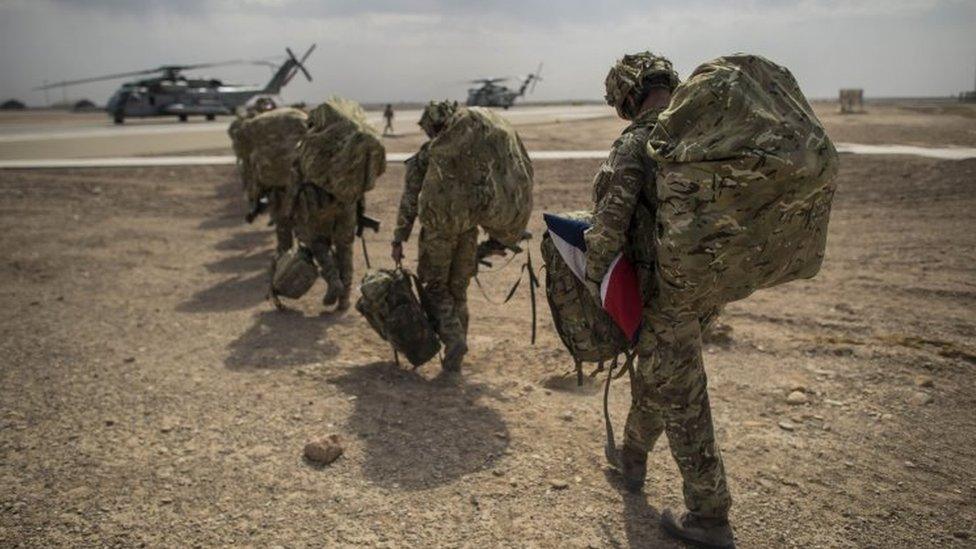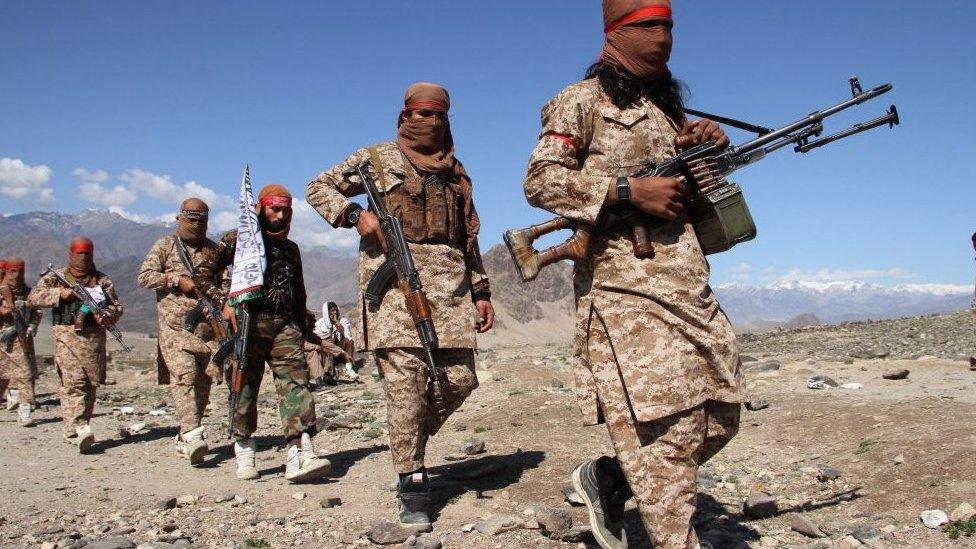Afghanistan troop withdrawal a strategic mistake, warns ex-general
- Published

Withdrawing troops from Afghanistan is a strategic mistake that risks a resurgence of terrorism, a former top UK general has said.
Gen Sir Richard Barrons, who was head of UK Joint Forces Command, told the BBC the UK and Western allies have "sold the future of Afghanistan".
Most British troops left last month and the Taliban have captured five cities in three days.
A senior Tory backbencher called it a "shabby withdrawal".
Fighting in Afghanistan intensified in recent weeks after President Joe Biden ordered the withdrawal of US forces, followed by allies such as the UK.
Two decades after they were removed from power by the US over their support for Osama Bin Laden in the wake of the 11 September attacks, Taliban militants are advancing across the country and have seized five regional capitals since Friday.
Gen Barrons told BBC Radio 4's The World This Weekend: "The withdrawal now is a strategic mistake. I don't believe it's in our own interest."
He said the decision had "sold the future of Afghanistan into a very difficult place" and sent a "really unfortunate message" to allies in Asia, Africa and the Middle East.
It suggests "we don't have the stomach to see these things through, and we would rather leave than ensure that a humanitarian or political crisis doesn't occur", Gen Barrons said.
"We will run the risk of terrorist entities re-establishing in Afghanistan, to bring harm in Europe and elsewhere," he said. "I think this is a very poor strategic outcome."
The UK government advised all British citizens to leave this week because of the worsening security situation.
But Gen Barrons said an exodus of the international community "as fair weather friends", followed by the Afghan elite, could undermine the government and its military, accelerating the crisis.
He said he feared the country could split in two or be plunged into a decades-long civil war unless political discussions could resume.

Tory MP Tobias Ellwood, chairman of the House of Commons Defence Committee, wrote in the Mail on Sunday that the UK was making a "shabby withdrawal" and "abandoning the country to the very insurgency that drew us there in the first place".
"Unless we wake up to the reality of what is taking place, Afghanistan might once again become a terror state. This, remember, is the country that brought us 9/11," he said.
The UK and its allies should retain an assistance force of 5,000 troops to give ground, air and intelligence support to the Afghan army in their fight against the Taliban, Mr Ellwood said.
By withdrawing, the UK was also giving up a "strategically crucial space to an expansionist China", he said.
But Gen Barrons suggested China would be key to any political resolution, because of its influence on Pakistan - which was one of the few countries to recognise the Taliban when it last held power.
He said because China shared a border with Afghanistan it would want to avoid any instability that could mean refugees - or militants - flowing over the border.
A UK Government spokeswoman said: "We recognise that the security situation in Afghanistan is serious, and reports of the escalating violence are extremely disturbing.
"We do not believe there is any military solution to Afghanistan's conflict, and call on the Taliban to end their campaign of violence and engage in meaningful dialogue with the Afghan government.
"There needs to be a negotiated solution to ensure a lasting peace."

TOKYO OLYMPICS: Can Shauna Coxsey help Radio 1's Jordan North overcome his fear of heights?
THE OLYMPIC MILE: What it's like to be an Olympian

- Published12 August 2022

- Published9 July 2021

- Published8 July 2021
